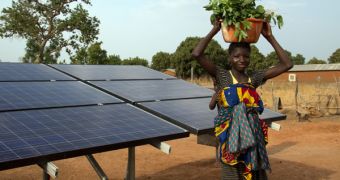Poverty, lack of resources and technology correlated with climate change effects like prolonged drought or extreme weather is lowering the quality of already low-value crops obtained by local communities in sub-Saharan Africa.
Stanford's Center on Food Security and Environment Works in partnership with Solar Electric Light Fund (SELF) to make sure than a solar-powered drip irrigation system will increase the profit of rural African farmers, Organic Connections reports.
As global warming is expected to worsen, Stanford scientists state that small-scale irrigation projects associated with hydrologic mapping could be the last hope for small farmers whose lives depend on traditional agricultural practices.
Experts are currently trying to attract investments in this sector, aiming to fight malnutrition and poverty in developing countries.
The two partners will find out how efficient the system relying on renewables really is, by studying solar-powered drip-irrigated gardens from villages located in West Africa's Sudano-Sahel region and establishing the exact value of nutritional and economic benefits offered by their project.
"Irrigation is really appealing in that it lets you do a lot of things to break this cycle of low productivity that leads to low income and malnutrition," stated Jennifer Burney from Stanford's Center on Food Security and Environment.
At this point in time, dams and canals could also represent an asset in improving the value of annually crops; unfortunately, poor farmers don't have access to this kind of projects worth billions of dollars.
Therefore, small-scale irrigations controlled by groups called smallholders seems like the most appropriate answer to their problems, that has developed into a popular trend widely embraced in sub-Saharan Africa.
This method can guarantee that groups of farmers will obtain profitable crops even during dry seasons.
Moreover, it represents a smart way of preserving water and it is also eco-friendly since it decreases fertilizer runoff. The partners have monitored the activity of 30 families and reached the conclusion that solar drip irrigations are really efficient.
This green technique allows farmers to eat the right amount of fruits and veggies recommended by U.S. Department of Agriculture and to remain financially stable even after the harvest season ends.

 14 DAY TRIAL //
14 DAY TRIAL //